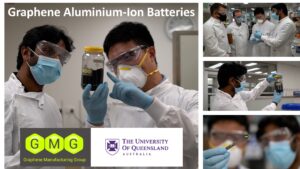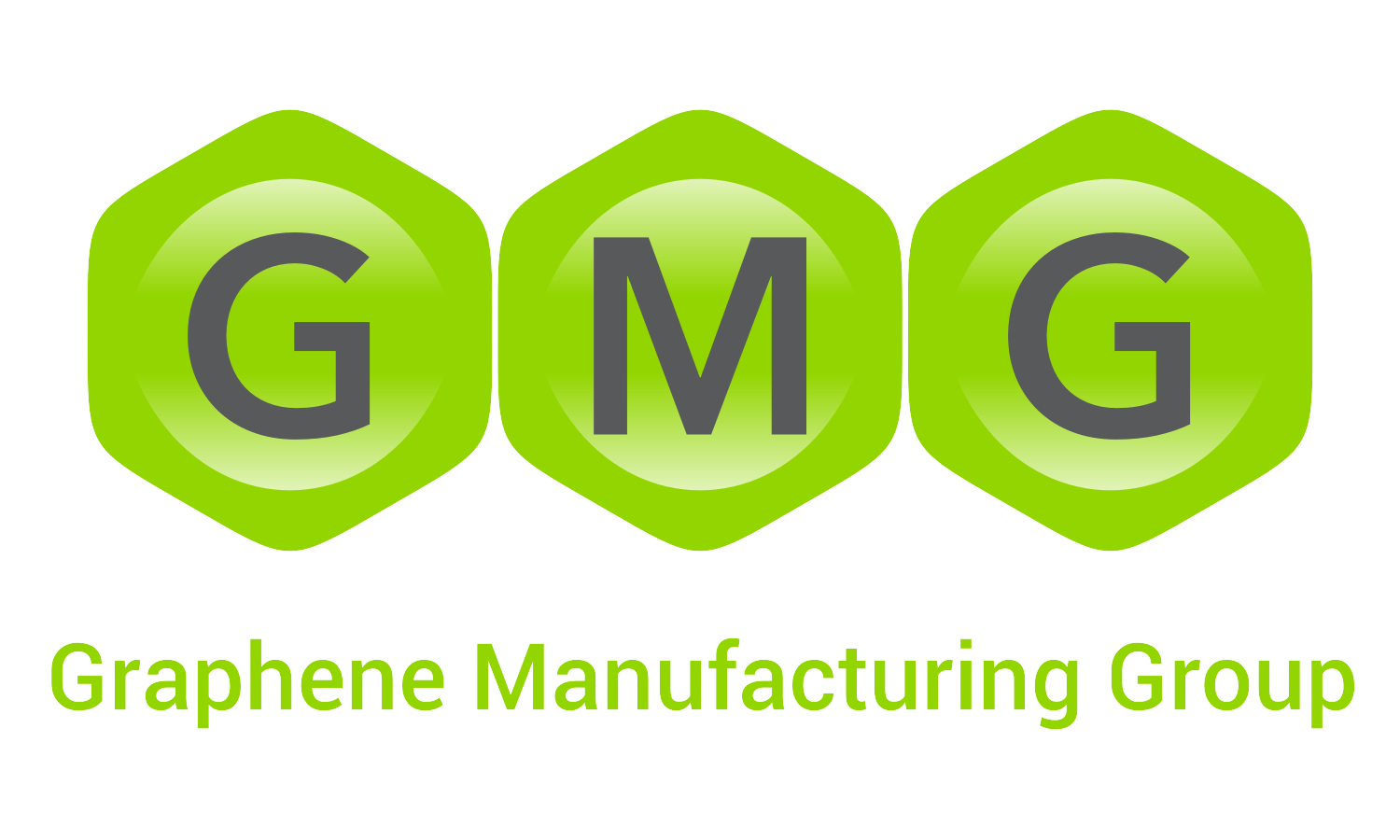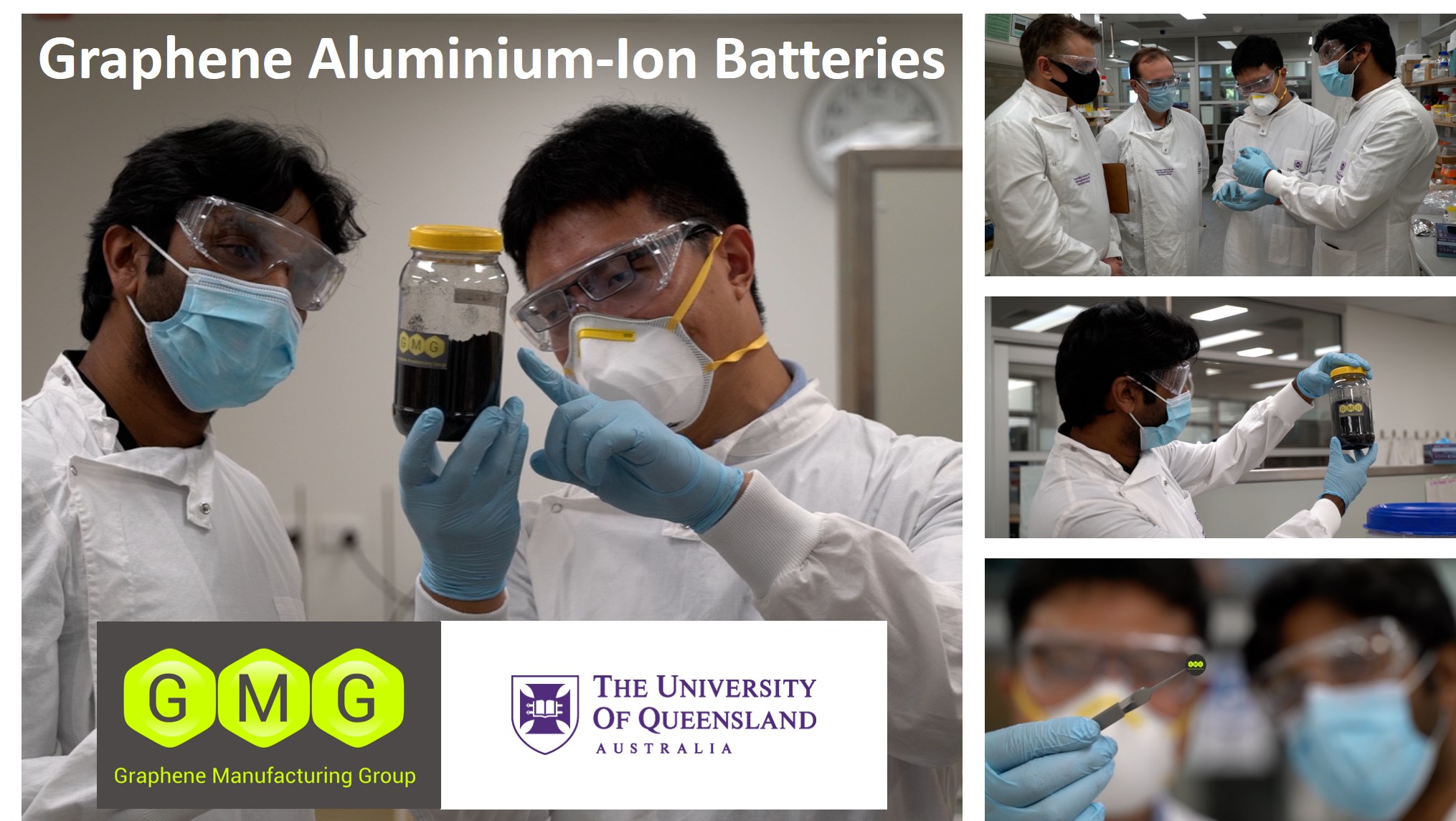GMG, The University of Queensland Research & Uni Quest kick off the Graphene Enhanced Aluminium Ion Battery Development Project

BRISBANE, QUEENSLAND, AUSTRALIA – April 22, 2021 – Graphene Manufacturing Group Ltd. (TSX-V: GMG) (“GMG” or the “Company”) is pleased to announce the execution of a research agreement with the University of Queensland’s Australian Institute for Bioengineering and Nanotechnology (“AIBN”) for the development of graphene aluminium-ion batteries. Under the agreement, GMG will manufacture commercial battery prototypes for watches, phones, laptops, electric vehicles and grid storage with technology developed at the University of Queensland (“UQ”). GMG has also signed a license agreement with Uniquest, the University of Queensland commercialisation company, which provides GMG exclusive license of the technology for battery cathodes.
The Company will incorporate technology devised by AIBN Professor’s Michael Yu, Dr Xiaodan Huang and postdoctoral student Yueqi Kong that has made graphene into more efficient electrodes for powering batteries. The results are a battery with up to 70 times faster charging and more sustainability with a life up to three times greater than lithium-ion. UQ’s research team was awarded A$390,000 over three years to develop the graphene aluminium-ion technology from the Australian Research Council’s Linkage Project in 2020. Under the terms of the agreement, GMG and UQ have agreed to pay A$150,054 and A$82,788 respectively to carry out the project. GMG has also agreed to reimburse the incurred patent execution costs up to an agreed maximum amount.
AIBN Director Professor, Alan Rowan commented, “We are delighted to partner with GMG to translate scientific ideas into commercial solutions through the development of more efficient and greener batteries. After several years of dedicated research into improving the aluminium ion battery, we are excited to be at the phase of developing commercial prototypes for more sustainable, faster-charging batteries,” Professor Rowan said. Testing showed rechargeable graphene aluminium-ion batteries had a battery life of up to three times that of current leading lithium-ion batteries, and higher power density meant they charged up to 70 times faster. The batteries are rechargeable for a larger number of cycles without deteriorating performance and are easier to recycle, reducing potential for harmful metals to leak into the environment.”
UniQuest CEO, Dr. Dean Moss stated, “Aluminium-ion battery with graphene electrodes could transform the existing rechargeable battery market, dominated by lithium-ion. Lithium-ion batteries demand the extraction of rare earth materials using large amounts of water and are processed with chemicals that can potentially harm the environment. This project has real potential to provide the market with a more environmentally friendly and efficient alternative.”
GMG Head Scientist, Dr. Ashok Nanjundan commented, “The project could deliver far-reaching benefits for energy storage, while the batteries were also safer because they do not use lithium, which had been known to cause fires in some mobile phones. This project is a great example of academia and business working together. The current recyclability of batteries is highly problematic due to their chemical properties and the stockpiling of dead batteries presents a large and looming environmental and public safety concern.”
GMG CEO, Craig Nicol, “To use local raw materials to manufacture battery cells at a competitive cost to replace imported lithium-ion cells is a massive opportunity for GMG and Australia to reduce supply chain risks and create local jobs. We’re excited about developing the commercial prototypes followed by initial production here in Australia – at a location yet to be determined.”
About GMG
GMG is an Australian based clean-tech disruptive company listed on the TSXV (TSXV:GMG) that produces graphene and hydrogen by cracking methane (natural gas) instead of mining graphite. By use of the company’s proprietary process, GMG can produce high quality, low cost, scalable, ‘tuneable’ and no/low contaminant graphene – enabling demonstrated cost and environmental improvements in a number of world-scale planet-friendly/clean-tech applications. Using this low input cost source of graphene, the Company is developing value-added products that target the massive energy efficiency and energy storage markets.
The Company is also in the early stages of pursuing additional opportunities for GMG graphene including the development of next generation batteries, collaborating with world leading universities in Australia, and investigating the opportunity to enhance the performance of biodiesel and diesel fuels.
For further information please contact:
– UniQuest, Brooke Baskin, [email protected], +61 7 3365 7480, +61 409 767 199
– Craig Nicol, Chief Executive Officer and Managing Director of the Company at [email protected], +61 415 445 223
– Leo Karabelas at Focus Communications, [email protected], +1 647 689 6041
Neither the TSX Venture Exchange nor its Regulation Services Provider (as that term is defined in the policies of the TSX Venture Exchange) accepts responsibility for the adequacy or accuracy of this news release.
Cautionary Note Regarding Forward-Looking Statements
This press release contains “forward-looking information” and “forward-looking statements” within the meaning of applicable securities legislation. The forward-looking statements herein are made as of the date of this press release only, and the Company does not assume any obligation to update or revise them to reflect new information, estimates or opinions, future events or results or otherwise, except as required by applicable law. Often, but not always, forward-looking statements can be identified by the use of words such as “plans”, “expects”, “is expected”, “budgets”, “scheduled”, “estimates”, “forecasts”, “predicts”, “projects”, “intends”, “targets”, “aims”, “anticipates” or “believes” or variations (including negative variations) of such words and phrases or may be identified by statements to the effect that certain actions “may”, “could”, “should”, “would”, “might” or “will” be taken, occur or be achieved. Forward-looking statements and information are subject to various known and unknown risks and uncertainties, many of which are beyond the ability of the Company to control or predict, that may cause the Company’s actual results, performance or achievements to be materially different from those expressed or implied thereby, and are developed based on assumptions about such risks, uncertainties and other factors set out herein, including, but not limited to, the risk factors set out under the heading “Risk Factors” in the Company’s final long form non-offering prospectus dated March 31, 2021 available for review on the Company’s profile at www.sedar.com. Such forward-looking information represents management’s best judgment based on information currently available. No forward-looking statement can be guaranteed and actual future results may vary materially. Accordingly, readers are advised not to place undue reliance on forward-looking statements or information.
“We’re excited about developing the commercial prototypes followed by initial production here in Australia – at a location yet to be determined” he said.
UQ’s research team was awarded $390,000 over three years to develop the graphene aluminium ion technology from the Australian Research Council’s Linkage Project in 2020.

